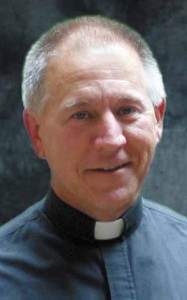By Fr. Bud Grant

Religious traditions, like nature itself, are always in a continuous state of change, as they are transformed in adaptation to ever-shifting environmental conditions. Indeed, evolutionary biologist David Sloan Wilson goes so far as to say that religion itself is “an adaptation that enables human groups to function as harmonious and coordinated units” (Darwin’s Cathedral 54).
While I have reservations concerning the socio-biological argument that societies and religions — like species and ecosystems — literally evolve, it is clear that traditions are dynamic. Philosopher Alastair MacIntyre makes this point clearly. According to him, traditions are rooted in the “founding narrative,” which for us is the Bible, of course, and that from this source they grow and spread like a vine’s branches, adjusting to the vicissitudes of history the way a tendril always seeks the sun. Sometimes a certain strand may wither, atrophy and die off because it was unable to adapt to its changing circumstances. There is nothing wrong with that.
Last year, I was privileged to be in St. Peter’s piazza for the Feast of Pentecost. The Holy Father took the occasion to warn us against the treason of traditions which makes us afraid of Spiritual “newness” that demands us to “leave behind our all too narrow, closed and selfish horizons.” He asks, not all together rhetorically, I suspect, “do we resist [the Holy Spirit], barricaded in transient structures which have lost their capacity for openness?” This is a powerful vision of the dangers of traditions that actually close us off the “newness” of the Spirit.
It would seem that retaining a clutch on our desperately guarded traditions would at least keep us together, but we must reject this insidious deception, too. Again, Pope Francis puts it best: “The Holy Spirit is the Spirit of unity, which does not mean uniformity, but which leads everything back to harmony … only the Spirit can awaken diversity, plurality, and multiplicity, while at the same time building unity … we are the ones who … close ourselves up in what makes us different … we bring division … uniformity, standardization.”
We are already well ensconced into another year. This isn’t a cyclical repetition, but something profoundly new — and always a bit frightening. Climate change ensures that ecological changes are afoot. We have to be nimble, adept, courageous and creative if we are to adjust to it. At the same time, all of us are also moving forward, inexorably, along with and within our Church. Our traditions can aid us in adapting as long as we recognize them for what they are: human inventions, of varying ages, variously mutated through use, and sometimes needing to be discarded as no longer useful — or worse, impeding our responsiveness by tempting us to cling to that which “makes us different … divided … uniform … standardized.”
New Year’s resolutions were made by the Romans in honor of their god Janus who, with his two heads, could see both the past and the future. It is important that he had that capacity for looking both backwards into tradition and forward into the new dawn. Christians adopted this custom — in part to cleanse that time of year from the bacchanals of the Saturnalia, culminating on Dec. 25. New Year’s resolutions came to America, perhaps, with the great reform theologian Jonathan Edwards who kept a compendium of his own resolutions with him. Sitting in his drafty house, hearing the whistle of the sharp New England January rattle through the window sills, he took quill, ink, and paper — all precious commodities in 18th century Connecticut — and wrote 70 resolutions, among which is this:
“Resolved, Frequently to take some deliberate action, which seems most unlikely to be done for the glory of God, and to trace it back to the original intention, designs, and ends of it, and if I find it not to be for God’s glory, to repute it” (Resolution 23).
Happy New Year.
(Father Bud Grant is a professor of theology at St. Ambrose University in Davenport.)







